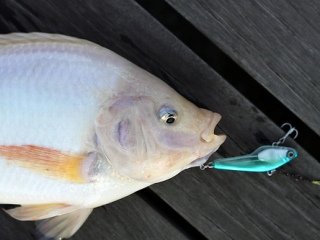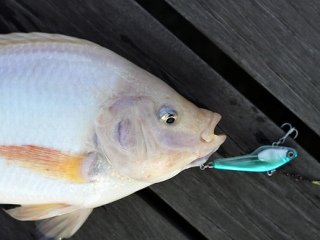 Most fishermen are so relieved when they finally muscle a fish to the boat that they don’t give very much thought as to how that feat is achieved. Sometimes, however, it can involve foul-hooking a fish, which is an unfortunate risk when fishing. There are several reasons for anglers to avoid foul-hooking their fish, and if you’re curious as to what they are, then I urge you to read on and gain a better understanding of why hooking fish properly in the mouth is always preferred.
Most fishermen are so relieved when they finally muscle a fish to the boat that they don’t give very much thought as to how that feat is achieved. Sometimes, however, it can involve foul-hooking a fish, which is an unfortunate risk when fishing. There are several reasons for anglers to avoid foul-hooking their fish, and if you’re curious as to what they are, then I urge you to read on and gain a better understanding of why hooking fish properly in the mouth is always preferred.
Similar to why hunters don’t simply shoot deer in the head to bring them down, anglers don’t foul-hook their fish. In many states and countries, a foul-hooked fish is not a legally caught fish. In fact, in tournaments, anglers aren’t allowed to keep fish that aren’t hooked in the mouth or gums. Such rules are in place to preserve the sportsmanship shared among fishermen.
Nine times out of ten, foul-hooking is accidental. Often, it occurs when a crankbait or spoon brushes against a fish and, when the angler feels that vibration, he/she jerks the rod and the treble hook snags the fish. Other incidents happen when an angler doesn’t feel the bite, and the fish swallows the hook. This will happen, but it’s important to make sure that when it does, you remove the hook cleanly and quickly, if possible. If the fish is hooked too deep or severe to remove it cleanly, the best thing to do is release it after cutting your line or keep it to not let it go to waste.
Fish already endure a large amount of stress and pain when hooked properly, and foul-hooking them only increases such an ordeal many times over. Fish that swallow a hook, or find themselves hooked in the stomach or head have a higher mortality rate than those hooked in the lip. Some believe that you should just leave a deeply-embedded hook in the fish, as it will rust out over time. However, hooks left in a fish’s body, especially ones obstructing their throats, will have largely adverse effects on the fish’s ability to survive. In fact, the pain involved when trying to swallow food with a hook stuck in their throats will cause the fish to regurgitate its food, and eventually cause it to starve.
If you practice catch and release when fishing, it’s important to remove your with minimal injury and stress to the fish. However, if the hook has been swallowed or imbedded in a vital organ, it’s best to keep the fish to eat or if you don’t eat fish, give it to someone who does. While most don’t try to foul-hook their fish, it is something that occurs on the water. It’s best to use common sense and quickly decide what to do when faced with the problem of foul-hooking. Making a conscious effort to remain alert and use your equipment properly can mean all the difference regarding the survival of a fish. Also, I’m sure the fish will be thankful for not finding a hook in its belly.








